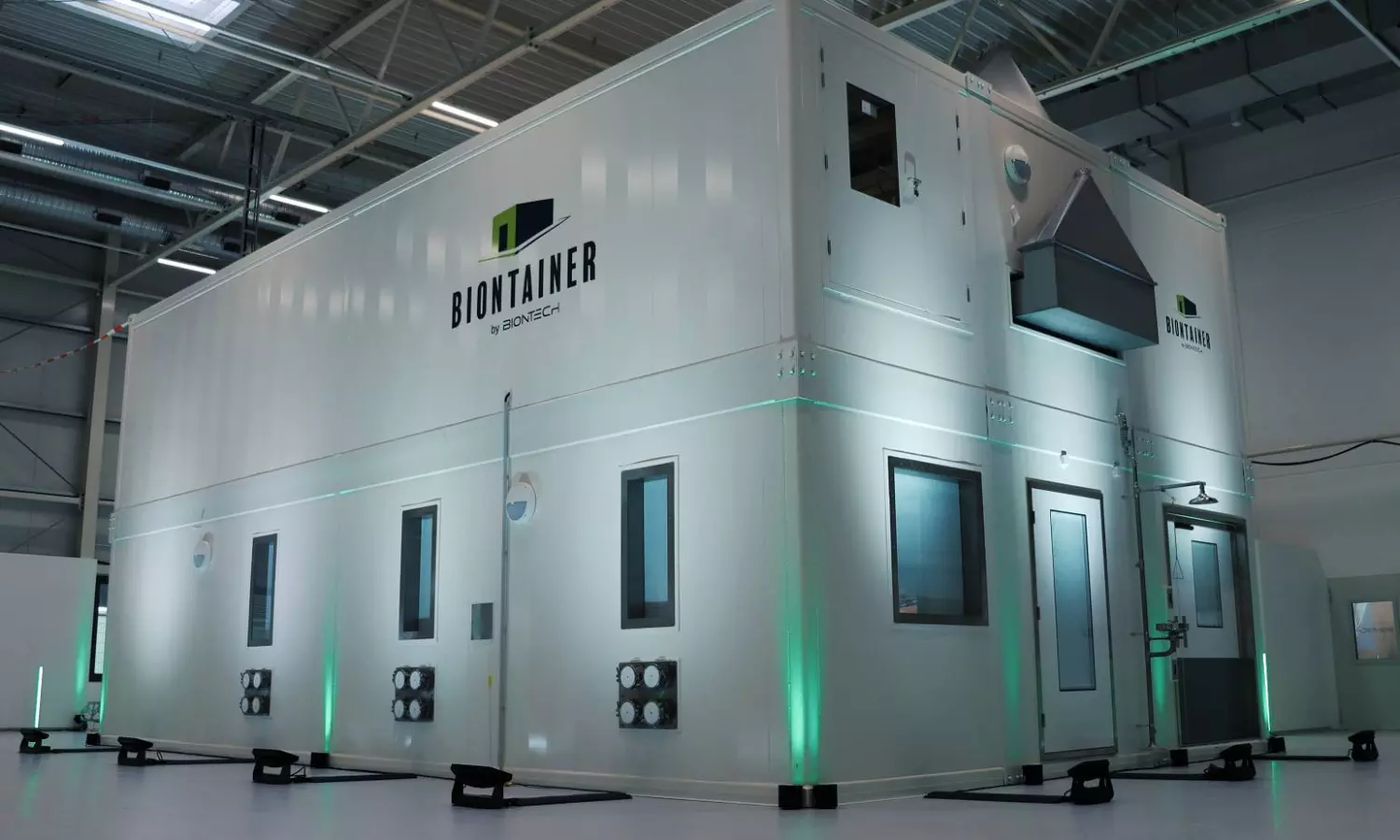BioNTech introduces first modular mRNA manufacturing facility to promote scalable vaccine production in Africa
First manufacturing facility to become a node in a decentralized and robust African end-to-end manufacturing network

The establishment of the first mRNA manufacturing facility by BioNTech in the African Union is expected to start in mid-2022. The first BioNTainer is expected to arrive in Africa in the second half of 2022
BioNTech SE has taken the next step to improve vaccine supply in Africa. The company has introduced its approach to establishing scalable vaccine production by developing and delivering turnkey mRNA manufacturing facilities based on a container solution. At a high-level meeting at BioNTech's new manufacturing facility in Marburg and at the invitation of kENUP Foundation, the company presented the container solution named "BioNTainer" to its key partners.
The manufacturing solution consists of one drug substance and one formulation module, each called a BioNTainer. Each module is built of six ISO sized containers (2.6m x 2.4m x 12m). This allows for mRNA vaccine production in bulk (mRNA manufacturing and formulation), while fill-and-finish will be taken over by local partners.
Each BioNTainer is a clean room that BioNTech equips with state-of-the-art manufacturing solutions. Together, two modules require 800 sqm of space and offer an estimated initial capacity of for example up to 50 million doses of the Pfizer-BioNTech COVID-19 vaccine each year. The BioNTainer will be equipped to manufacture a range of mRNA-based vaccines targeted to the needs of the African Union member states, for example, the Pfizer-BioNTech COVID-19 vaccine and BioNTech's investigational malaria and tuberculosis vaccines if they are successfully developed, approved, or authorized by regulatory authorities.
The capacity can be scaled up by adding further modules and sites to the manufacturing network on the African continent. One of the most critical parts of the manufacturing process is quality control, which includes all necessary tests for each finished vaccine batch. In partnership with local quality control testing labs, BioNTech will help to ensure the identity, composition, strength, purity, absence of product- and process-related impurities, as well as the absence of microbiological contamination of each produced batch.
The attendees at this meeting included President Macky Sall of Senegal, President Nana Akufo-Addo of Ghana, President Paul Kagame of Rwanda, Tedros Adhanom Ghebreyesus, Director-General of the World Health Organization, John Nkengasong, Director of the Africa Centers for Disease Control and Prevention (Africa CDC), and Svenja Schulze, the Federal Minister of Economic Cooperation and Development of Germany. Together with BioNTech's Co-Founders Prof. Ugur Sahin, CEO, and Prof. Özlem Türeci, CMO, and COO Dr. Sierk Poetting, they jointly discussed the infrastructure, regulatory and technological requirements to establish an end-to-end manufacturing network for mRNA-based vaccines in Africa.
The establishment of the first mRNA manufacturing facility by BioNTech in the African Union is expected to start in mid-2022. The first BioNTainer is expected to arrive in Africa in the second half of 2022. Manufacturing in the first BioNTainer is planned to commence approximately 12 months after the delivery of the modules to its final location in Africa.
BioNTech expects to ship BioNTainers to Rwanda, Senegal, and potentially South Africa in close coordination with the respective country and the African Union. BioNTech will be responsible for the delivery and installation of the modules, while local organizations, authorities, and governments will ensure the needed infrastructure.
Partners in Ghana and South Africa could support the manufacturing with fill-and-finish capacities. BioNTech will work closely with local authorities to ensure compliance to relevant regulatory procedures of the national regulatory agencies in each partner country, and also coordinate where appropriate with relevant continental and international agencies, including WHO, Africa CDC, the African Medicines Agency (AMA), and the African Union Development Agency (AUDA-NEPAD).
BioNTech will initially staff and operate the facilities to support the safe and rapid initiation of the production of mRNA-based vaccine doses under stringent good manufacturing processes ("GMP") to prepare for the transfer of know-how to local partners to enable independent operation. Vaccines manufactured in these facilities are expected to be dedicated to domestic use and exported to other member states of the African Union at a not-for-profit price.
Speaking on the development, Dr. Tedros Adhanom Ghebreyesus, WHO Director-General said "WHO is committed to working with all partners to ensure every country can access vaccines and other tools to protect the health of their populations. We can only achieve that goal through genuine cooperation on local vaccine development, production, distribution, and uptake, through greater diversity of platforms. Collaboration on training, research, and strengthening regulatory systems will also be key for success. We welcome BioNTech's initiative to increase vaccine production in Africa, as a complement to WHO's mRNA technology transfer hub in South Africa and its network of 'spokes' around the world."
Prof. Ugur Sahin, CEO, and Co-founder of BioNTech said, "Today's milestone brings us one step closer to our goal of improving healthcare by making our innovations accessible worldwide. I want to thank our teams in Mainz and Marburg who worked day and night to bring the first containers to Marburg, our center for innovative manufacturing solutions. I am grateful for the support of the great leaders and experts who joined us today. It is an honor to work with them to make a difference and to support sustainable vaccine access, establishing regional manufacturing facilities in Africa – with the people on the African continent. I am optimistic that the next time we meet in front of BioNTainers, it will not be in Europe, but in Africa."


